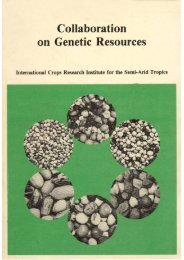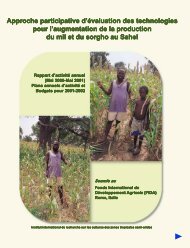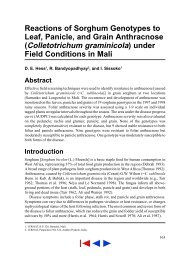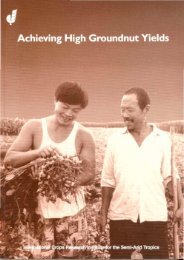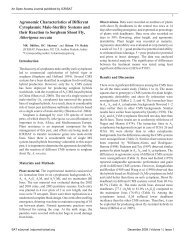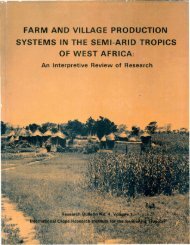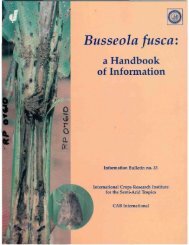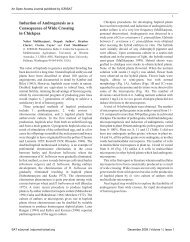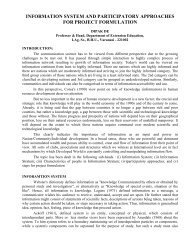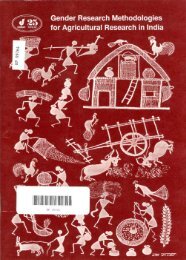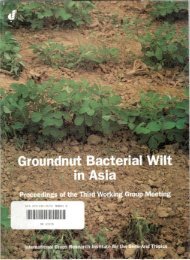RA 00048.pdf - OAR@ICRISAT
RA 00048.pdf - OAR@ICRISAT
RA 00048.pdf - OAR@ICRISAT
You also want an ePaper? Increase the reach of your titles
YUMPU automatically turns print PDFs into web optimized ePapers that Google loves.
decisions on marketing should start off f r o m a<br />
g o o d understanding of h o w marketing actually<br />
w o r k s in t h e area in q u e s t i o n — a n d that they<br />
o f t e n do not do this. Generally, t h e y start f r o m a<br />
s t e r e o t y p e that is a priori, ideological, and devoid<br />
of factual k n o w l e d g e . In t h e s e circumstances,<br />
generalization about w h a t w o r k s in comparable<br />
conditions e l s e w h e r e is a m o s t constructive aid to<br />
policy making. For example, the general conclusion<br />
that fixed nation-wide prices leave t h e official<br />
board to buy f r o m the m o s t r e m o t e surplus areas<br />
and sell to t h e m o s t inaccessible deficit areas has<br />
important policy implications. Similarly, the finding<br />
that official agencies that set out to handle all t h e<br />
m a r k e t e d crop s e l d o m handle m o r e than 2 0 % o f i t<br />
should be t h e subject of serious comparative<br />
investigations. W h y . i s t h e latter t h e case? Are t h e<br />
reasons the s a m e in different cases? Is it because<br />
(a) the price to producers is t o o l o w given t h e<br />
price to c o n s u m e r s ? (b) t h e price to c o n s u m e r s is<br />
t o o high given the price to producers? (c) t h e<br />
organizations are operationally incapable of serving<br />
all producers a n d / o r all c o n s u m e r s w h e n they<br />
w a n t to trade? (d) do t h e private marketing channels<br />
offer valued services to producers a n d / o r<br />
c o n s u m e r s w h i c h t h e official channels do not<br />
offer?<br />
The other thing that policy m a k e r s ought to take<br />
into account in a conscious w a y is: w h a t are t h e<br />
objectives of their policies? I am s o m e w h a t<br />
skeptical about t h e suggestion that all t h e official<br />
authorities had similar objectives. It s e e m s even<br />
m o r e clear that the t w o " f a c t i o n s " m e n t i o n e d<br />
(Harris vs Berg) do not have t h e s a m e objectives.<br />
Objectives are not simple, and involve major<br />
trade-offs: e.g., is the objective to develop private<br />
entrepreneurs or to eliminate t h e m ? Is it m o r e<br />
c o n c e r n e d w i t h t h e purchasing p o w e r of peasants<br />
than that of urban w o r k e r s ? Is it m o r e c o n c e r n e d<br />
about price stability than about operational robustness?<br />
The w h o l e aim of policy-oriented research is to<br />
predict w h a t interventions will achieve w h a t<br />
objectives in w h a t circumstances, and w h i l e this<br />
m u s t b e f o u n d e d i n k n o w l e d g e o f t h e s y s t e m s t o<br />
be m o d i f i e d , it m u s t also involve intelligent<br />
generalizations f r o m situations that involve at<br />
least partial parallels. A retreat into careful local<br />
studies w i t h o u t generalization is not t h e a n s w e r .<br />
Indeed it is a recurrent t h e m e of e c o n o m i c s that<br />
w h e n w e f i n d that t h e o r y i s letting u s d o w n , w e<br />
retreat into e m p i r i c i s m , only to find that it gets us<br />
n o w h e r e .<br />
So far as research strategy is c o n c e r n e d , this<br />
paper tends to support N o r m a n ' s generalization<br />
that present conditions in t h e provision of public<br />
sector services to farmers in African countries are<br />
not conducive to f o o d production strategies that<br />
place heavy reliance on such services; i.e., that a<br />
better s e r v i c e / m a r k e t i n g structure m u s t either be<br />
part of t h e package or the package m u s t be robust<br />
e n o u g h to survive w i t h o u t it. It also carries a fairly<br />
simple policy m e s s a g e t o g o v e r n m e n t s w h i c h<br />
think they can run crop marketing.<br />
Lastly, I m u s t c o m m e n t on Dr. von O p p e n and<br />
Rao's paper. If I may parody it slightly, it c o n <br />
cludes that t h e unpopularity of high-yielding<br />
varieties (HYVs) in India arises f r o m t h e l o w<br />
m o n e t a r y value of the associated fodder production<br />
w h i c h m e a n s that the total financial yield of<br />
HYVs is only about 6% higher than that of local<br />
varieties and therefore "hardly w o r t h " t h e extra<br />
cost of using HYVs. We are not, incidentally, told<br />
w h a t t h o s e extra costs are. It concludes that it is<br />
w o r t h breeding for better straw quality in HYVs.<br />
I f o u n d the research and analysis fascinating,<br />
but I w o u l d qualify the conclusion. The other<br />
notable p r o b l e m w i t h HYVs is t h e l o w e r price of<br />
t h e grain, w h i c h according to this paper sells for<br />
only 7 0 % of the price of local varieties. A grain<br />
quality i m p r o v e m e n t that added 1 0 % t o t h e price<br />
w o u l d add about Rs. 260 to financial yield per<br />
hectare. A fodder quality i m p r o v e m e n t that a d d e d<br />
1 0 % to price w o u l d increase financial yield by only<br />
about Rs. 8 0 - 9 0 . If there is any trade-off in<br />
resources b e t w e e n breeding for i m p r o v e d grain<br />
and breeding for improved fodder, I w o u l d suggest<br />
concentration on grain. I w o u l d , h o w e v e r ,<br />
agree on t h e importance of fodder-improving<br />
t e c h n o l o g i e s — s i l a g e , alkali, early stooking (for<br />
g r e e n fodder).<br />
S o m e of the other important questions are also<br />
left o p e n . W h a t do people w a n t s o r g h u m for? It is<br />
an inconvenient grain to process and to store o n c e<br />
processed. W h y has its price risen above w h e a t<br />
and rice in Indian markets? I do not k n o w t h e<br />
a n s w e r at all, but we do n e e d a n s w e r s to t h e s e<br />
questions so as to find out t h e qualities we are<br />
trying to produce.<br />
A n o t h e r big question is w h y so little s o r g h u m is<br />
m a r k e t e d . I have put this q u e s t i o n to people here<br />
and t h e y have a n s w e r e d " b e c a u s e t h e f a r m e r<br />
produces for his o w n c o n s u m p t i o n only." This is<br />
n o t an a n s w e r ; it is a r e s t a t e m e n t of t h e situation.<br />
A n o t h e r a n s w e r is " t h e farmer cannot p r o d u c e in<br />
e x c e s s of his o w n r e q u i r e m e n t s . " This is certainly<br />
7 1 9



